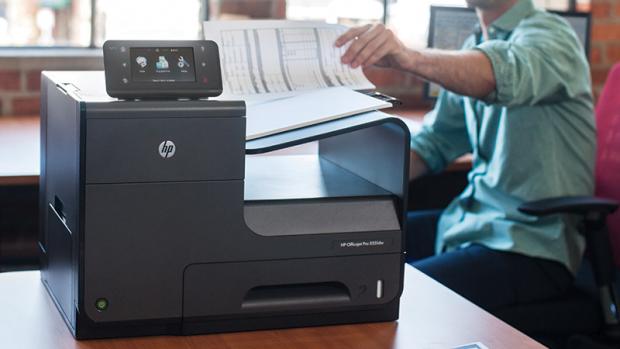The future of business
How will technology change the way we work in the future?

In business as in our everyday lives, technology is driving transformation. Already businesses are embracing mobility and experimenting with new means of communication and collaboration. They’re looking at technologies like virtualisation, cloud computing or PageWide printing, that can help them work more efficiently. They’re using social networks and business analytics to understand their customers and serve them better. Yet all of this is just the beginning. As these trends continue and new disruptive technologies emerge, the office of the future could be very different from the office of today.
The Future Workforce
Businesses are already changing to reflect both the people that work within them and the customers they serve. On the one hand, younger workers, particularly those in the ‘millennial’ generation, have very different expectations from previous generations. According to PWC’s 2015 report, Millenials at Work, they’re defined by a desire for flexibility and a good work/life balance, and by their affinity for technology and an online, digital world. On the other hand, the needs of work are changing, demanding closer collaboration and a more agile, responsive approach. Whatever the industry, business will move faster. Managers and their teams must be able to work faster still.
The Week
Escape your echo chamber. Get the facts behind the news, plus analysis from multiple perspectives.

Sign up for The Week's Free Newsletters
From our morning news briefing to a weekly Good News Newsletter, get the best of The Week delivered directly to your inbox.
From our morning news briefing to a weekly Good News Newsletter, get the best of The Week delivered directly to your inbox.
All these factors could help create companies with a flatter, less hierarchal structure, where the focus is more on what you do as a team than on where individuals can excel. We may see a rise in the ‘portfolio career’, focused more on changing roles and developing a broader skillset than on simply climbing the career ladder.
The continuing shift from desktop computing to mobile devices, whether lightweight laptops, convertible devices or tablets, is already giving workers the tools they need to operate away from the office, so that they can work wherever most makes business sense.
Meanwhile, the spread of super-fast broadband and the ubiquity of business-grade messaging and chat apps, cloud-based collaboration platforms, not to mention video conferencing apps, will continue to make it as easy to collaborate even when you can’t be in the office.
This will answer Millenials’ demand for flexibility and could even enhance productivity. A 2015 study for the journal Psychological Science in the Public Interest concluded that working from home could be more effective when combined with face-to-face time at the office and took job responsibilities and individual capabilities into account. Combine that with social networks tailored for business, and you have teams that can collaborate effectively, even when they’re geographically far apart.
The Future Workplace
This change to how we work could be reflected in the spaces that we work in. A 2014 report for the insurance group, Unum, talks of ‘intuitive workplaces’ that transform to reflect the needs of their users, and of ‘collaborative workplaces’ that make it easier for employees to work where they need to work and with whom they need to work with. Hot-desking is clearly a feature here, enabling a more efficient use of office space in companies where not everyone will be found at the same desk, every day. Mobile and flexible workers get a space to work when they need it, but companies can operate in smaller spaces using fewer resources without affecting productivity. Instead of cubicles, collaborative spaces make it easier to work through projects or brainstorm new ideas.
The Internet of Things may bring further opportunities, using wearable technologies and cloud-based data to track employee work patterns and use the data to optimise the office space. Smart heating, lighting and desk-booking systems should help larger companies drive overheads down.
Some companies are already in the vanguard. Citrix has swapped some of its desks for genius benches at its London HQ, giving employees a choice of long, shared desks with stools, plus movable desks that can be configured for collaborative tasks. Lego, meanwhile, has offices divided into flexible work zones with no fixed seating, where employees who leave a workspace for more than 90 minutes have to leave the desk empty when they go. In May 2016 88% of staff said they liked the new way of working, stating that it allowed them to pick different areas to match their activity or mood.
Future Technologies
Technology will also evolve to match this future workplace. Smartphones will still be ubiquitous; the go-to information and communication tool both in and out of the office. Ultra-light, ultra-slim laptops like the HP EliteBook Folio 1020 and versatile 2-in-1 devices like the HP Elite X2 1012 will develop into even more convenient and flexible devices, with the power to run the most demanding apps and the stamina to last through and beyond the working day. New generations of lightweight, compact printers, based on PageWide technology, will give the new-style office the printing power it needs with lower running costs, less noise, lower power consumption and in less space. 3D printers could revolutionise businesses involved in architecture, apparel or product design.
We’re also likely to see new devices enter the office space. Virtual Reality headsets and Augmented Reality devices, such as Microsoft’s Holo-Lens, could help us visualise our operations in a more immersive way, or deliver face-to-face meetings or site visits without the cost and hassle of travelling in person. Some of us may even work part-time in virtual or part-virtual environments, taking us to a dedicated workspace without a commute.
Innovative desktop computers, including HP’s Sprout Pro, are already allowing businesses to explore the potential of blended reality, its projectors, cameras and 3D scanners allowing users to mix physical objects with digital environments and applications within a single, seamless virtual space. Expect the ideas it pioneers to trickle down into new form factors and devices. In the future, using such technologies to talk and share ideas will seem as natural as passing a printout does now.
Smarter Systems
Yet the most pervasive transformations may not come from the devices we use, but from the software and services they interact with. Analytics or business intelligence is already changing the way large enterprises work, but the same concepts will trickle down into more and more businesses, while harvesting ever larger and more diverse sets of data for insight. The results could impact everything from the way companies work internally to the products they sell, the services they deliver and who they sell or deliver them to. Intuitive tools and dashboards will make it easier for ordinary workers to make full use of analytics without needing to understand how it all works. Even on mobile devices you’ll have the data you need at your fingertips.
In fact, you may not even need to know where to look. Bots are already being pushed as the next great computing platform, allowing users to get the information they need or perform crucial tasks through a simple conversational interface, in the same social apps they already use. HP is already leading the way through its Print Bot; a Facebook Messenger bot that prints photos on request, using natural language all the way. Microsoft, meanwhile, is working on bots that can record business meetings and transcribe them, even distinguishing between participants in the final transcript. Business-focused bots could be big.
As HP’s Innovation Manager, David Parry says ‘Eventually, bots will be able to handle administrative tasks in a very easy way - reservations, hotels, banking. As Artificial Intelligence is able to anticipate needs and proactively talk to you, it'll get more exciting.’ What goes for consumers will go double for business users. In fact, the more we get used to working with digital personal assistants like Apple’s Siri or Microsoft’s Cortana, the easier it will get to just ask our systems to handle our everyday business needs.
What’s more, we’ll be talking to a whole new class of digital assistant, once Cognitive Computing enters the office in a big way. The likes of Microsoft, Google and HP are already at work on powerful, cloud-based AI systems with the power to analyse vast quantities of data, yet the ability to use that data to help us handle the smaller-scale decisions we make every day. Together, cognitive and conversational computing platforms could help us work more effectively, giving us the information we need, even before we know we need it – and in the most natural way possible. These systems won’t replace us, but by working in tandem with them we’ll be able to work better. Isn’t that a future that we’d all like to see?
A free daily email with the biggest news stories of the day – and the best features from TheWeek.com
-
 Antonia Romeo and Whitehall’s women problem
Antonia Romeo and Whitehall’s women problemThe Explainer Before her appointment as cabinet secretary, commentators said hostile briefings and vetting concerns were evidence of ‘sexist, misogynistic culture’ in No. 10
-
 Local elections 2026: where are they and who is expected to win?
Local elections 2026: where are they and who is expected to win?The Explainer Labour is braced for heavy losses and U-turn on postponing some council elections hasn’t helped the party’s prospects
-
 6 of the world’s most accessible destinations
6 of the world’s most accessible destinationsThe Week Recommends Experience all of Berlin, Singapore and Sydney
-
 Transform your business the right way
Transform your business the right wayfeature Saving time, money or space only really matters if you do something constructive with those savings.
-
 When should you print?
When should you print?feature We live in a digital age, but there's still a need for printed documents.
-
 Six ways to cut costs in your business
Six ways to cut costs in your businessfeature Saving money is important for any business. Here we’ll show you how to cut costs without cutting productivity.